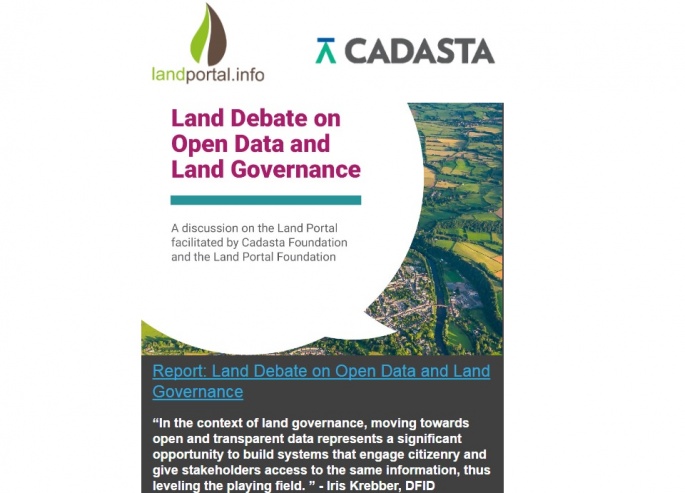Land Debate on Open Data and Land Governance


In September 2016, the Land Portal and the Cadasta Foundation held a debate on Open Data and Land Governance. The highly substantive discussion included the perspectives from 26 participants from key players in government land agencies, international institutions and NGOs.
__________________________________________________________________________________________________
Across most contexts, government data sources on land are largely inaccessible, from land administration data, such as parcel data and ownership information to land investments, contract data and even policy information.
With often differing interpretations among EU Directives for geospatial datasets, common principles and processes are lacking for determining what data should be open.
According to the Open Data Barometer - only two countries, New Zealand and the United Kingdom, obtained a full 100% score on the topic of Land Ownership.
However, with an ambitious 2030 Agenda for Sustainable Development, there is an increasing need to pool data resources toward solving global challenges - while protecting the rights of vulnerable populations. Successful implementation of this Agenda will require collaborative efforts, data coordination and sharing across the land community.
A conversation on these issues between Cadasta Foundation and the Land Portal Foundation (throughout the three-week Land Debate, September 2016) aimed at improving comprehension on the current landscape, potential impacts as well as illustrate the unique challenges in opening land data.
CURRENT LANDSCAPE
# Barriers to openness: privacy and concerns about data quality
Occasionally data may be deemed sensitive by the individuals the data is about, particularly when working with indigenous or forest-dwelling communities. Participants cautioned that community mapping may exacerbate local tensions between and within communities regarding land disputes, and some communities may worry about spatial data being shared publicly.
# Opening the data: an opportunity instead of a threat
If combined with proper mechanisms for processing feedback from data users, opening data can actually help land administration agencies enhance data quality and support them in the protecting the rights of individuals.
“Data on the customary lands of local communities is crucial to advocacy efforts, securing legal recognition of communities’ land and resource rights, and measuring global progress on this critical issue”, - Jamie Kalliongis & Jenna DiPaolo Colley, Rights and Resources Initiative (RRI). “Open data is an important requisite for transparency, accountability, participation, and integrity”, - Annette Jaitner of Transparency International (TI). “The implementation of (the land rights) indicator can and should benefit from new sources of global data”, - Diana Fletschner, Sr. Director of Research and Evaluation, Landesa. |
RESPONSIBLE DATA SOLUTIONS. STRONGER GOVERNANCE STRUCTURES
There is a need to take a more sophisticated approach regarding the technical structures for capturing these rights as well as our understanding for what land datasets tell us.
Throughout the debate, participants highlighted interesting ways to balance: personal privacy, power asymmetries and security concerns with openness.
Download the report to read more what the experts are saying on open data and land governance - most important challenges and issues confronting the world today.
The Land Portal aims to improve land governance to benefit those with the most insecure land rights and the greatest vulnerability to landlessness through information and knowledge sharing. For more information, visit the Land Portal at www.landportal.info |
Cadasta Foundation is dedicated to the support, continued development and growth of the Cadasta Platform – an innovative, open source suite of tools for the collection and management of ownership, occupancy, and spatial data that meets the unique challenges of this process in much of the world. For more information, visit Cadasta at cadasta.org |
Related contents:
- Introducing the Agricultural Open Data Package: BETA Version (GODAN)
- The 3rd Workshop on Creating Impacts with Open Data in Agriculture and Nutrition (13-15 February, 2017, The Hague, Netherlands)
- The Legal Interoperability of Research Data: Principles and Implementation Guidelines (from the CODATA-RDA Legal Interoperability Interest Group) on ZENODO

